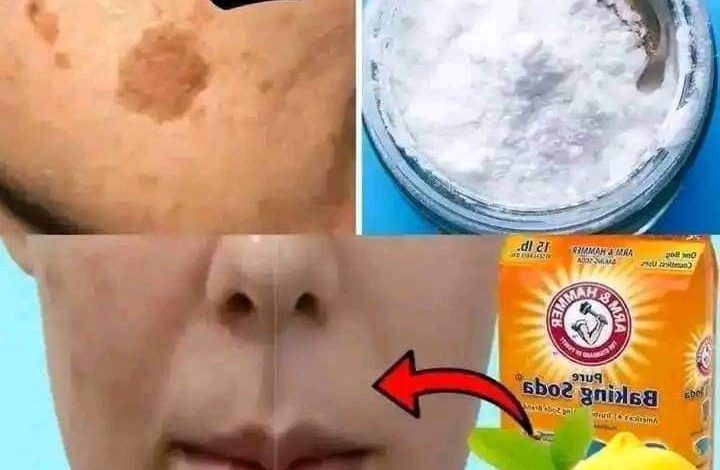
ADVERTISEMENT
The Use of Baking Soda and Lemon for Skin Care: Benefits and Cautions
The image you’ve shared suggests a home remedy that involves using baking soda and lemon to treat skin issues, such as hyperpigmentation or dark spots. This combination is popular in many DIY skincare recipes due to its potential benefits, but it’s also important to be aware of the risks and how to use these ingredients safely.
The Benefits of Baking Soda and Lemon for Skin
1. Baking Soda:
- Exfoliation: Baking soda acts as a gentle exfoliant, helping to remove dead skin cells and unclog pores. This can lead to smoother, brighter skin.
- Alkaline Properties: Baking soda is alkaline, which can help to neutralize the acidity of the skin and potentially reduce acne and inflammation.
2. Lemon:
- Vitamin C: Lemons are rich in vitamin C, which is a powerful antioxidant that can help to lighten dark spots, brighten the complexion, and fight signs of aging.
- Astringent Properties: The natural acids in lemon juice act as an astringent, which can help tighten the skin and reduce oiliness.
How to Use Baking Soda and Lemon for Skin Care
If you choose to use this remedy, it’s important to do so carefully to avoid skin irritation. Here’s a basic method:
Ingredients:
ADVERTISEMENT
- 1 tablespoon of baking soda
- Juice of half a lemon
- Water (optional, to dilute)
Instructions:
- Mix: Combine the baking soda with the lemon juice to form a paste. You can add a little water if the mixture is too thick or strong for your skin.
- Apply: Gently apply the mixture to the affected area, such as dark spots or areas with hyperpigmentation. Avoid the eye area and any broken skin.
- Leave On: Let the mixture sit on your skin for about 5-10 minutes. If you experience any discomfort or irritation, rinse it off immediately.
- Rinse: Thoroughly rinse your face with lukewarm water, making sure to remove all traces of the mixture.
- Moisturize: Apply a gentle moisturizer to hydrate your skin after treatment.
Frequency: This treatment should not be done more than once or twice a week to prevent over-exfoliation and irritation.
Cautions and Considerations
While this combination can be beneficial, it also has potential risks:
- Skin Sensitivity: Both baking soda and lemon juice can be harsh on the skin, especially if used too frequently or in high concentrations. They can disrupt the skin’s natural pH balance, leading to dryness, irritation, or increased sensitivity.
- Sun Sensitivity: Lemon juice can make your skin more sensitive to the sun, increasing the risk of sunburn and further pigmentation. Always apply sunscreen if you’ve used lemon juice on your skin, even if you’re indoors.
- Patch Test: Before applying the mixture to your face, do a patch test on a small area of skin to ensure you don’t have an adverse reaction.
- Not for All Skin Types: If you have sensitive, dry, or broken skin, this remedy may not be suitable for you. Consult with a dermatologist if you’re unsure.
Alternatives for Skin Lightening and Brightening
If you’re looking for safer and more effective alternatives, consider these options:
- Vitamin C Serum: A concentrated vitamin C serum can offer the brightening benefits of lemon juice without the risk of irritation.
- Niacinamide: This ingredient is known for its ability to reduce pigmentation and even out skin tone without causing sensitivity.
- Aloe Vera: Known for its soothing properties, aloe vera can help lighten dark spots and hydrate the skin.
Conclusion
While baking soda and lemon juice are popular ingredients in DIY skincare, they must be used with caution due to their potential to irritate the skin. If used correctly, they may help reduce dark spots and brighten the complexion, but it’s important to be mindful of the risks. For those with sensitive skin or who are seeking more reliable results, considering alternative products designed for hyperpigmentation and skin brightening might be a better approach. As always, it’s wise to consult with a dermatologist before starting any new skincare regimen.
ADVERTISEMENT




